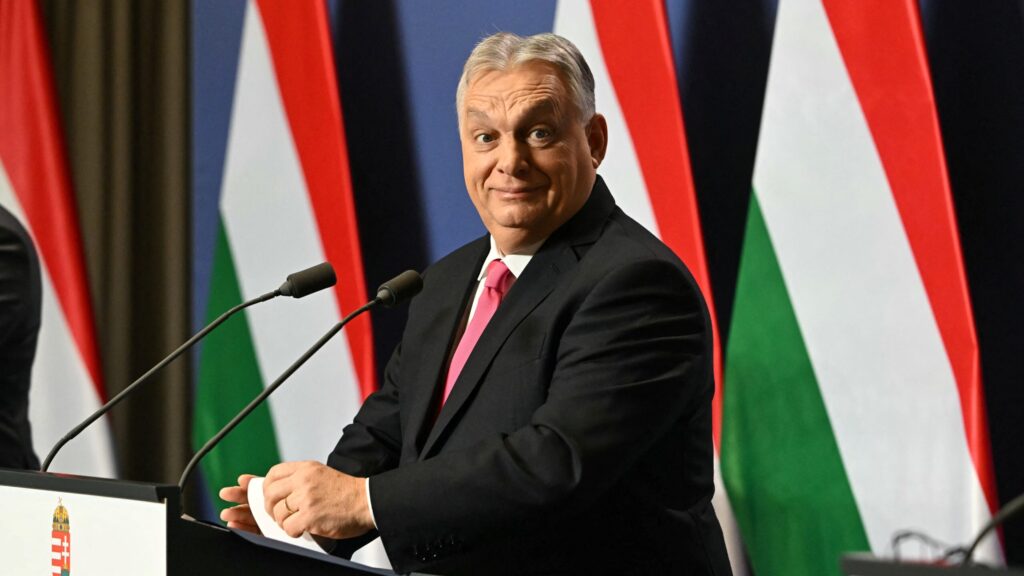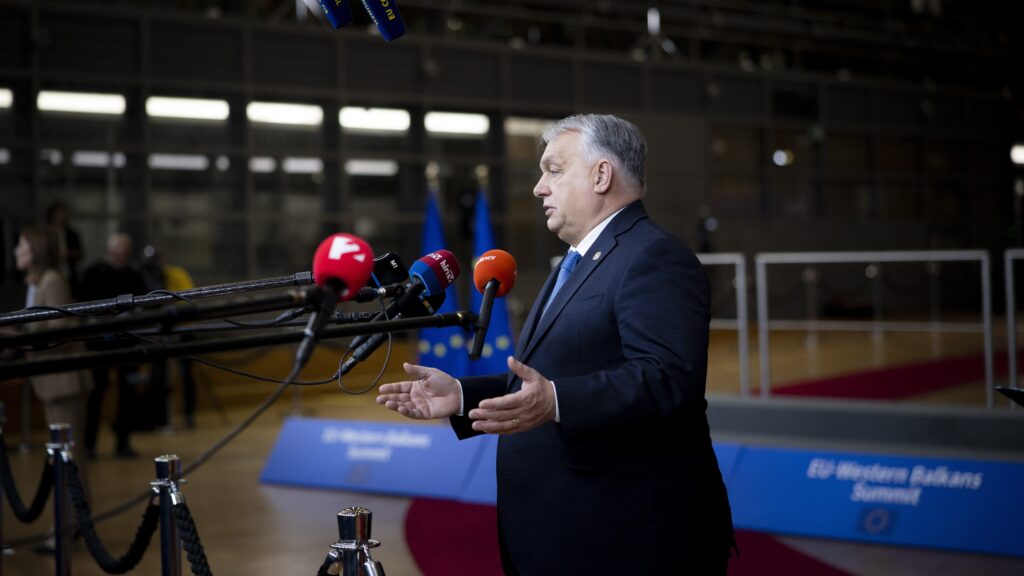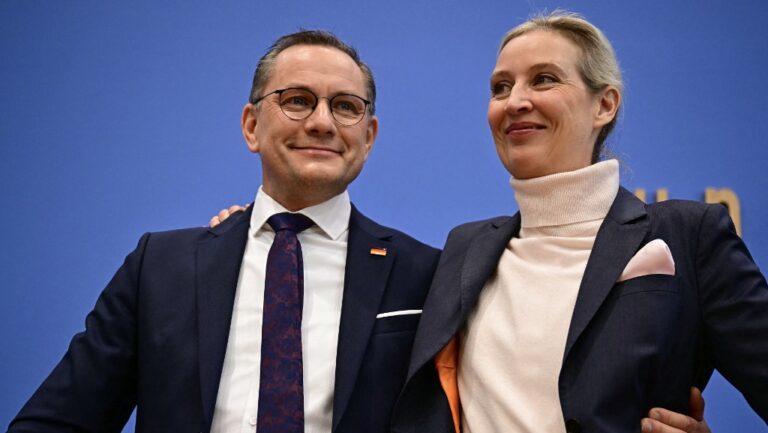The below remarks by János Bóka, Minister for European Union Affairs, were given at the international conference titled The Rule of Law as Lawfare organized by the Danube Institute, The Center for Fundamental Rights, and The European Conservative in Budapest on 27–28 May 2024.
Dear Colleagues, Ladies and Gentlemen,
I commend the Danube Institute for the excellent initiative to organize a conference on Rule of Law as Lawfare. The topic is crucial, the timing is appropriate, the invited experts are competent and respected and the venue is one of the best you can find in the city or the continent for that matter—and most importantly you don’t have to worry about authorities banning the event or the police stopping you from entering.
As a matter of fact, there is a competing event scheduled for today, organised by the CEU Democracy Institute—you know this is the higher education institution that left Hungary without actually leaving; a launch event for its Rule of Law Clinic. The speaker is the Polish Minister of Justice, Mr Adam Bodnar who will address—I quote—’the legal and political challenges in rebuilding the rule of law in Poland’. Budapest is one of the few cities in Europe where these two events can actually take place in parallel, where ideas and interpretations can actually compete. I think we should pause for a minute here and grasp the significance of this freedom and the importance of safeguarding this freedom for the next generations. We cannot take this for granted.
But this coincidence also prompted me to reconsider the tone and content of my keynote speech today. I think time has come to speak with full clarity about rule of law as a political concept in the European Union—its origins, its content, its objectives, its agents and mechanisms. And then, with full clarity about rule of law as a legal concept that could and should be applied in the European Union. And then, with full clarity about the fact that these two issues are completely unrelated.
Article 2 of the Treaty on European Union states that the EU is founded on certain values, including respect for the rule of law, and that these values are common to the Member States. The Treaties do not contain a definition of rule of law or any reference to any sources where this definition is to be found. Then, Article 7 in the same Treaty outlines two procedures. A preventive arm for cases where there is a clear risk of a serious breach by a Member State of the values, and a sanctioning arm for cases where there is a serious and persistent breach by a Member State of the values.
These procedures are purely political by design, there are no legal benchmarks or criteria and there is no involvement of the Court of Justice of the EU.
Some historical background is also necessary to understand the true meaning of this mechanism. The preventive arm was introduced by the Nice Treaty in 2001 when political sanctions against Austria for forming a government with the participation of FPÖ backfired. At that time, these political sanctions were outside the scope of the Treaties and had nothing to do with the rule of law situation in Austria. They simply sent the message that certain political parties, certain politicians, certain statements and certain policies are not tolerated in the EU regardless of the democratic decision-making processes in Member States. The conclusion was not that such political sanctions should be discontinued—exactly the opposite: they should be transformed into regulated procedures and should be included in the Treaties. But the intentions remained the same.
In this context, it is important to properly understand recent legal and institutional developments, including the annual rule of law reports by the Commission, the rule of law dialogue in the Council, the general budgetary conditionality, the horizontal enabling conditions for the cohesion funds, the so-called super milestones in the Recovery and Resilience Plans and last but not least the constantly developing jurisprudence of the Court of Justice on the EU becoming a community of values and EU law becoming a set of values instead of a set of rules.
These developments are not aimed at changing the nature or objective of the rule of law instruments of the EU. The interventions remain purely political in nature and their objective remains to discredit certain political forces, to coerce them into changing their key policies and ultimately remove them from power if necessary. These developments are aimed at making the available tools more effective. First, they try to mask the purely political nature of these tools by creating a semblance of a procedure that applies to all Member States and is based on objective criteria. Second, they establish additional coercive measures that are easier to adopt and now include access to certain EU funds. This, of course, required the European Parliament, the Commission, the Court of Justice and key Member States to play along—which they were happy to do for very diverse reasons; and most Member States remained silent because they thought they were never going to be affected or simply feared retaliation.
As a result, now we have an annual rule of law report by the Commission that focuses on four areas: the judicial system, the anti-corruption system in Member States, media pluralism and media freedom and other institutional aspects related to checks and balances that include a wide variety of issues from NGO environment to the transparency of the legislative procedures. It goes without saying that these areas do not reflect any structured concept of the rule of law and are determined by political convenience. The country chapters of the reports now include recommendations that are non-binding but are cross-referenced in the European Semester process in the country-specific recommendations that in turn form the basis of the Member States’ Recovery and Resilience Plans that need to be implemented in order to access RRF funds.
Member States discuss the country chapters of these reports in the so-called rule of law dialogue in the Council that is a totally meaningless ritual with only one objective: to show that the EU deals with the rule of law situation in all Member States not just a few ones selected for political reasons. In the beginning, we tried to raise issues of serious concern in other Member States and highlight inconsistencies and double standards in the approach taken by the Commission vis-à-vis different Member States. We were, of course, rebuked and told that we misunderstood the point of the exercise.
They were right, we indeed misunderstood the point which was to legitimize political pressuring of certain Member States on the pretext of rule of law concerns.
The Commission’s rule of law reports are also part of the attempt to provide an objective and legalistic—I deliberately don’t use the term ‘legal’—cover for a fundamentally political process. In this exercise, the Commission is enormously assisted by NGOs financed by the Commission itself, and the Court of Justice. In particular, the Court has started to develop a jurisprudence on the content of rule of law in preliminary ruling and infringement procedures concerning the judiciaries. For our purposes, the meaning of this exercise is twofold: first to give the impression that ‘rule of law’ is a properly defined legal concept that can serve as the basis of not only political but legal proceedings; and second to indicate that the monopoly of the interpretation of ‘rule of law’ now belongs to the Court and national institutions, including constitutional courts, must align or risk being circumvented by regular courts having direct recourse to and authorisation from the Court of Justice in Luxembourg.
This is, of course, part of a wider political agenda pursued by the Court, namely to turn EU law from a body of rules into a body of values and standards. Supposedly, it has to do something with the fact that the EU is not only a community of law but also a community of values. I strongly believe the European Union to be a community of values. Not only and not primarily because the text of the Treaties is open to such interpretation but because it is a fact. However, I think that the argument that if the EU is a community of values than EU law must be transformed into a body of values, and consequently EU institutions, including the Court of Justice will become the designated venue for value disputes, is not convincingly made. But I am afraid, I must leave this extremely important issue aside here because it is well beyond the scope of my keynote speech.
So, the mission is accomplished to mask the purely political nature of the rule of law related procedures by creating a semblance that they apply to all Member States and are based on objective criteria. Now we come to the part of establishing additional coercive measures that are easier to adopt and include access to certain EU funds. Of course, you can cut access to EU funds under Article 7 as well but this is seen by all as a political decision and in addition requires a previous unanimous decision in the European Council which is close to impossible to get. For additional coercive measures, you need a legal base in the Treaties which allows qualified majority decision making and you need to be able to explain that the procedure you created is not simply a duplication of the Article 7 procedure.
The first part is easy, especially if the Court of Justice is on your side which is granted in this case because it perfectly fits into its agenda of redefining EU law as a body of values. The Court ruled that a general budgetary conditionality that allows suspension of EU funds in the case of rule of law related concerns is a ‘financial rule which determines in particular the procedure to be adopted for establishing and implementing the budget and for presenting and auditing accounts’ and therefore falls under the scope of Article 322 TFEU.
The second part is more difficult because here you need to prove that a rule of law related concern that has
an impact on the financial interests of the EU is not really a rule of law related concern anymore but a financial one.
And then you need to completely dilute the concept of financial impact to a level where no actual impact is needed but an indirect risk is already enough to establish a connection. If you manage to do that then you will end up with a procedure that protects the financial interests of the EU from rule of law related concerns even if there is no actual impact on the financial interests of the EU—so the only thing you actually have is a rule of law related concern—nevertheless this is not a rule of law procedure because if it were it would be a duplication of Article 7 which is against the Treaties. If you can’t follow—don’t blame yourself.
So, as a result we now have two types of rule of law related procedures. There are those that are openly and exclusively political in nature—Article 7 procedure is an example of that. If I look at the history of how they were started and how it is about to be closed in the case of Poland, and how Hungary was threatened with the suspension of our voting rights if we don’t agree to certain decisions concerning Ukraine in December last year and February this year, I believe no further explanation is needed. As regards Article 7, there is no need to discuss standards, rules or benchmarks. It is hard core politics and must be treated as such.
Then, there are procedures that are political procedures with a legal mask, e.g. the conditionality procedure. This is a more complex story where you are expected to engage with the Commission exactly the same way you play chess with a pigeon. Now don’t get me wrong, I don’t mean this in a derogatory sense, because I think neither pigeons nor the Commission is stupid. Chess is a sophisticated game with strict rules. When you play chess you challenge your opponent with the objective to prevail within a framework of rules and assume that your opponent wants to do the same. Now when you play with a pigeon, it will also move the pieces on the board, sometimes even according to the rules. It very rarely wins but it couldn’t care less, obviously has a good time and keeps you occupied for quite a while. And at some point, the pigeon decides it had enough and flies away. You might think this is because you won the game and the pigeon gave up. But don’t forget that the pigeon doesn’t know a thing about chess so how could it know whether it is winning or losing. So the reason for the pigeon to stay and play on or leave and give you a break must be found beyond the game of chess.
In the conditionality procedure, the Commission’s approach is very similar. It wants you to engage in an activity where the Commission can bend the rules so it can place pieces on the board the way it wants and there is not much you can do about it. The point is not to win the game but for the Commission and the Member State to pretend that you are engaged in a meaningful activity, i.e. an objective and rules-based procedure that will go on as long as the Commission so desires. At some point the Commission might decide to end this activity but this decision has very little to do with the actual situation on the chessboard, it is related to its political agenda.
And to push this metaphor to the extreme, we are playing not one but at least four such games in parallel. And in this simultaneous display the Commission can maximize its leverage by connecting the different games.
This is a very disillusioned, almost cynical picture that I painted for you.
Indeed, I believe that EU procedures designed to enforce rule of law standards on Member States are political tools.
They are used in a tactical sense to coerce political concessions or changes from non-compliant Member States. And they are used in a strategic sense to advance the federalist project by side-lining national constitutional institutions and claim the monopoly of interpreting and enforcing values that are supposed to be common in Member States.
Of course, these processes could be improved. A real constitutional dialogue could make the content of rule of law less contested. A better use of the comparative method and more involvement of Member State authorities could reduce the chance for obvious misinterpretation and misunderstanding of national legal institutions. It does not change the political nature and the tactical and strategic objectives of the rule of law instruments. It is lipstick on a pig. But in fact, that pig doesn’t even want lipstick. It doesn’t need it because obviously it is considered attractive enough without it and any refinement or constraint of the rule of law procedures would make them less efficient from a political point of view.
I am closing my remarks by emphasizing that regardless of my scepticism concerning existing rule of law instruments I firmly believe the EU is in dire need of a rule of law instrument but this instrument should be turned upside down. It should guarantee that the principle of rule of law developed and applied in Member States is similarly implemented in the activities of EU institutions. Most importantly it should include mechanisms that properly limit the EU’s activities to the conferred competences. But this is not possible by adjusting or improving existing instruments: a completely new approach is needed.
This new approach requires Treaty change which in turn requires a strong political support. To build this political support we must first survive. To survive we need to mitigate the harmful effects of the EU’s lawfare against us. That requires playing chess with a pigeon. But on the other hand, we must not legitimise the process by accepting the legal and procedural masking of a political exercise. That would require chasing away the pigeon and turning over the chessboard.
To be honest with you, I am not quite sure how to do the two things at the same time—but I hope today’s and tomorrow’s conference will bring us closer to the solution. With this in mind, I wish you an interesting and meaningful exchange of views.







